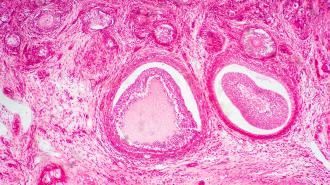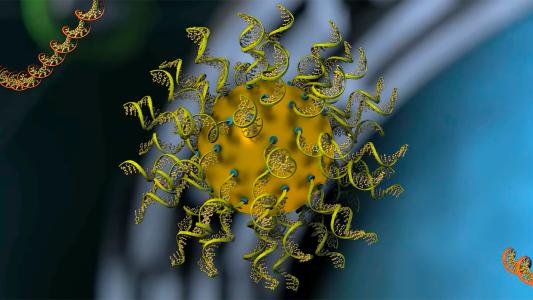Researchers from Sweden’s Karolinska Institute have found a way to make CAR T-cell therapy effective in mice with ovarian cancer — suggesting that the revolutionary blood cancer treatment could one day be used against solid tumors, too.
The therapy: CAR T-cell therapy is a type of cancer treatment that starts with a patient’s own T cells, a type of immune system cell, extracted from a blood sample. Doctors then engineer the T cells to display proteins, called “chimeric antigen receptors” (CARs), which are designed to target the cancer.
The engineered cells are multiplied in the lab and infused back into the patient. The CARs then bind the T cells to proteins on the surface of cancer cells, helping the immune system attack and destroy them.
“Tumors often arise in an environment that’s unfavorable for T cells.”
Jonas Mattsson
The challenge: The FDA has approved six CAR T-cell therapies so far, and all of them target blood cancers — the approach simply isn’t effective enough against solid tumors, which account for the majority of cancer diagnoses.
“Tumors often arise in an environment that’s unfavorable for T cells, in part due to a low oxygen level,” said Jonas Mattsson, one the study authors. “This can cause attacking T cells to be neutralized, which impairs the therapeutic effect.”
The study: For their new study, published in the Journal for ImmunoTherapy of Cancer, the Karolinska researchers set out to see if they could make CAR T cells effective against ovarian cancer, which affects about 1% of people with ovaries.
Because ovarian tumor cells often express the protein mesothelin, they started by engineering three types of CAR T cells to target that protein — the differences between them had to do with a part of the CAR T cell called the CD3ζ chain, which plays a role in activating T cells.
By modifying the CD3ζ chain, they were able to improve the T cells’ persistence, and they were able to survive longer in the unfavorable conditions around the tumors.
Mice treated with the M1xx CAR T cells lived longer than the rest.
They then tested each type of CAR T cell in mouse models of ovarian cancer.
They discovered that mice treated with any of the three types lived longer than those that went untreated, but one type (M1xx CAR T cells) looks particularly promising.
Those cells remained functional longer, and mice treated with them lived longer than the rest. Theirs were also the only tumors that actually shrank.
“In several mice, there were no tumor cells left that we could detect, and the effect lasted just over three months after the treatment started,” said Mattsson.
Looking ahead: The Karolinska team isn’t the first to target mesothelin with a CAR T-cell therapy, and clinical trials of previous treatments have shown them to be only modestly effective.
“Hopefully, this discovery will pave the way for a clinical study.”
Jonas Mattsson
That isn’t stopping researchers from trying, though — Verismo Therapeutics, a University of Pennsylvania spinout, is expected to begin enrolling participants with mesothelin-expressing ovarian tumors in a phase 1 trial to test its own CAR T-cell therapy in the first quarter of 2023.
The Karolinska team is hopeful that it’ll be able to trial its own mesothelin-targeting CAR T cells in people, too — and that the treatment will prove to be as effective in humans as it is in mice.
“Hopefully, this discovery will pave the way for a clinical study,” said Mattsson. “Our goal is to predict the optimal conditions for producing CAR T cells able to infiltrate and attack the tumor and survive in the bodies of women with ovarian cancer.”
We’d love to hear from you! If you have a comment about this article or if you have a tip for a future Freethink story, please email us at [email protected].






